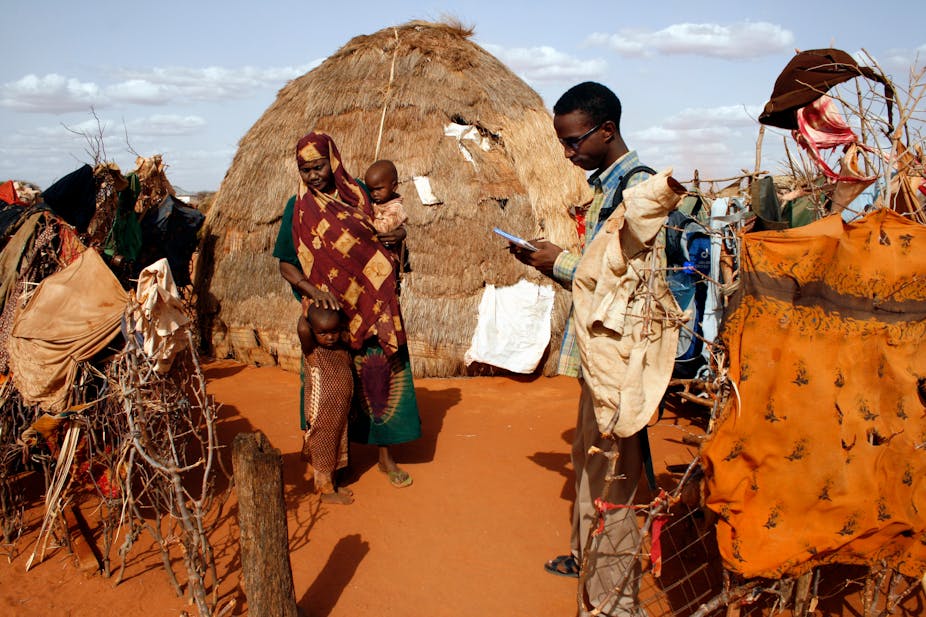
Scientists don’t conduct research just to satisfy their own curiosity. Research is meant to benefit society by raising public awareness and creating products and innovations that enhance development. For research to serve its full purpose, the results must leave the confines of research laboratories and academic journals.
As researchers, we need to do more to ensure that our findings end up in the hands of those who are affected by them. This is especially true in African countries, where disciplines often exist in silos and many researchers come in from other continents. The people who share their lives with researchers seldom see the results of their efforts.
As a researcher interested in the impact of environmental, social and economic factors on the health of women and children, I strive to connect with my participants to relay my research findings to them. I’m particularly concerned with HIV/AIDS in low resource countries, and prevention of mother-to-child transmission of HIV in sub-Saharan Africa.
In Zambia, for example, I organised workshops for interested participants after surveying their knowledge of breastfeeding practices. I shared with them what I’d found and gave them more information about breastfeeding. I’ve also created a platform, the Africa Interdisciplinary Health Conference, which gives healthcare providers in both clinical and academic or research settings a way to discuss their research findings.
Findings that are effectively communicated can go a long way to serve the interests of the public. They can help to address social injustices or improve treatments offered to patients.
Barriers to sharing
Many researchers seem to be content with sharing the results of their studies in academic journals or at conferences. They are less active in public engagement and feedback. But few journals allow everybody to read the findings. Most grant access to subscribers only. Even articles that are freely available are usually written in academic language that the average reader doesn’t understand.
For researchers in the tenure-track system, their main goal is winning tenure, which in part can be achieved by getting a number of papers published in prominent journals. Pressures like this mean community-level outreach is not prioritised.
Many researchers lack writing skills or may find it difficult to describe their results to a general audience as they are trained to write for fellow specialists. They may worry about whether the public will understand their findings, or about findings being used to influence controversial policies and actions.
These concerns cause some researchers to shy away from communicating their findings outside the academic community.
Research participants want to know the results of the studies in which they participate. Many researchers argue that sharing results with participants is an ethical obligation. Researchers must send their findings to all participants who want to receive them, even if they feel that the findings will not benefit these participants. This may promote trust in the research process and encourage strong and long-lasting collaboration between researchers and the participants.
Disseminating research findings beyond academic publications is particularly crucial for addressing certain social disparities. Providing findings can help families, communities, educators, healthcare providers, policymakers, government agencies and other stakeholders to understand and respond to crises that plague society. More effective responses to safety, health, or welfare related challenges can be developed. Sharing community-based research findings has the potential to improve the livelihood of the people involved as it creates an opportunity for them to learn and know more about themselves.
The benefits of sharing findings flow both ways. Engaging with other researchers and the public can lead to unexpected new connections and new ideas that could create fruitful new directions for research.
Bridging the gap
To benefit both researchers and the communities they serve, it’s important to find innovative, accessible ways to share the work.
Institutions and funding organisations should support more researchers to publish in open access journals so that the public doesn’t have to pay to read them. Institutions and researchers should invest in partnerships that expand capacity for sharing results more broadly.
Furthermore, ethics committees should make it mandatory for researchers to share their results with the public. Every research participant should opt in or out of receiving results, as part of the process of giving informed consent.
There could be misunderstanding or misinterpretation of the findings presented by the researcher as this may be full of technical terms. But this can be resolved by researchers engaging the services of professional writers or communication officers to help with translating their study into a language the average reader can understand. Many research institutions have public relations and communication officers who have the skills to translate academic research into more accessible language and share it widely with media outlets and the public.
Sharing results with the people who are most affected by them makes us better researchers and ensures that our work can be used to improve people’s lives. Institutions and collaborators must recognise the value of doing so.![]()
Jerry John Nutor, Assistant Professor, Family Health Care Nursing, University of California, San Francisco
This article is republished from The Conversation under a Creative Commons license. Read the original article.

